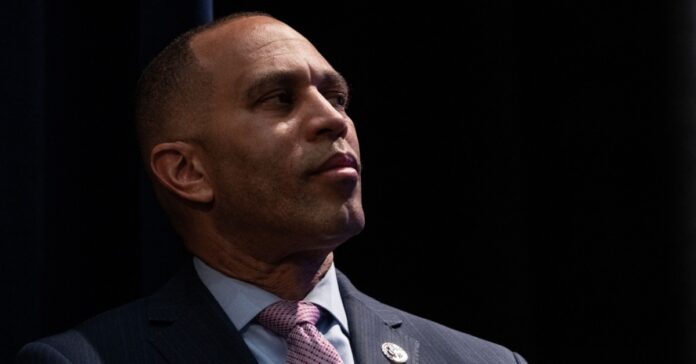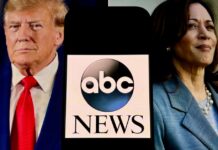
About half an hour after President Joe Biden withdrew from the presidential race on Sunday, he and several top Democrats scrambled to endorse his vice president, Kamala Harris, for the Democratic nomination.
Throughout the day, Democrats from former President Bill Clinton to Rep. Annie Kuster, chair of the moderate New Democrat caucus, to progressives like Rep. Alexandria Ocasio-Cortez (D., N.Y.), took turns calling on Harris to unify the nation after weeks of party turmoil. Yet, some of the most high-profile figures within the party kept conspicuously quiet.
Former President Barack Obama, Senate Majority Leader Chuck Schumer, and House Democratic Leader Hakeem Jeffries declined to endorse Harris immediately. Instead, these figures spent Sunday crafting glowing tributes to Biden’s legacy.
“Joe Biden has been one of America’s most consequential presidents, as well as a dear friend and partner to me,” wrote Obama in a Medium post. Obama, who chose Biden as his running mate in 2008 because he wanted a running mate with “gray in his hair,” praised Biden’s presidency without mentioning Harris.
Schumer expressed that Biden was a great president, legislative leader, and an amazing human being. He acknowledged that Biden’s decision was difficult but highlighted that Biden once again prioritized the country, the party, and the future. Schumer emphasized that Biden’s actions demonstrated his patriotism and dedication to America.
Jeffries echoed these sentiments, stating that Biden was one of the “most accomplished and consequential leaders in history.” Jeffries also expressed that America is a better place today due to President Joe Biden’s leadership, which he described as marked by intellect, grace, and dignity. He conveyed that the nation is forever grateful for Biden’s contributions.
What do these three leaders, who failed even to mention Harris in their statements, have in common? They were the most influential voices calling for Biden to drop out and are now wary of exercising further political power by “coronating” Harris.
The New York Times reported that Obama wanted Sunday to be about Biden after quietly backing calls for Biden to drop out for weeks. The President is a prideful man and is still “deeply resentful of his treatment under not only the Obama staff but also the way he was pushed aside for Hillary Clinton” in 2016, MSNBC host Joe Scarborough said last week.
Sources told NYT that immediately endorsing another candidate could’ve been perceived as a further snub to Biden while also serving as a political misstep. Already, advisors to former President Donald Trump have characterized Biden’s choice to step down as an “attempted coup.”
Trump campaign senior adviser Chris LaCivita told Politico that Biden’s decision to step down was tantamount to deposing the president of the United States. He argued that one cannot step down as a candidate for president due to cognitive impairment while still serving as president.
House Speaker Mike Johnson (R-La.) even suggested on Sunday that placing another Democrat on the ticket would be illegal, though Biden was never formally named the nominee.
In light of these criticisms, Obama and other figures are trying to avoid being painted as elite puppet masters. Both Jeffries and Schumer, for their part, played an extensive role in encouraging Biden to drop out, the Wall Street Journal reported. Schumer, in particular, appealed to Biden personally, driving to his beach house in Delaware on Saturday, July 13th, to meet in person with the President.
“I do not expect you to walk out of this room making a decision,” Schumer told Biden at the conclusion of the meeting, “but I hope you will think about what I said.” After Biden asked for another week to think, the two men hugged. Then, a little over a week later, Biden announced he was ending the campaign.
High-profile Democrat Michael Bloomberg also withheld his endorsement of Harris, urging Democrats to gauge voter sentiment, particularly in battleground states, to identify the candidate best positioned to win in November and lead the country over the next four years.
Some Democrats have shared Bloomberg’s desire to slow down and consider other candidates in an open primary. Before endorsing Harris on Monday, Politico reported that Pelosi led the charge for an open primary–with mini-events held by top Democrats–to address concerns that party bosses were choosing the President rather than the voters.
Yet Pelosi’s endorsement of Harris might indicate that those plans are too lofty, with only 105 days left for the Democratic presidential candidate to campaign before the election.
In her statement, Pelosi expressed immense pride and limitless optimism for the country’s future as she endorsed Vice President Kamala Harris for President of the United States.







